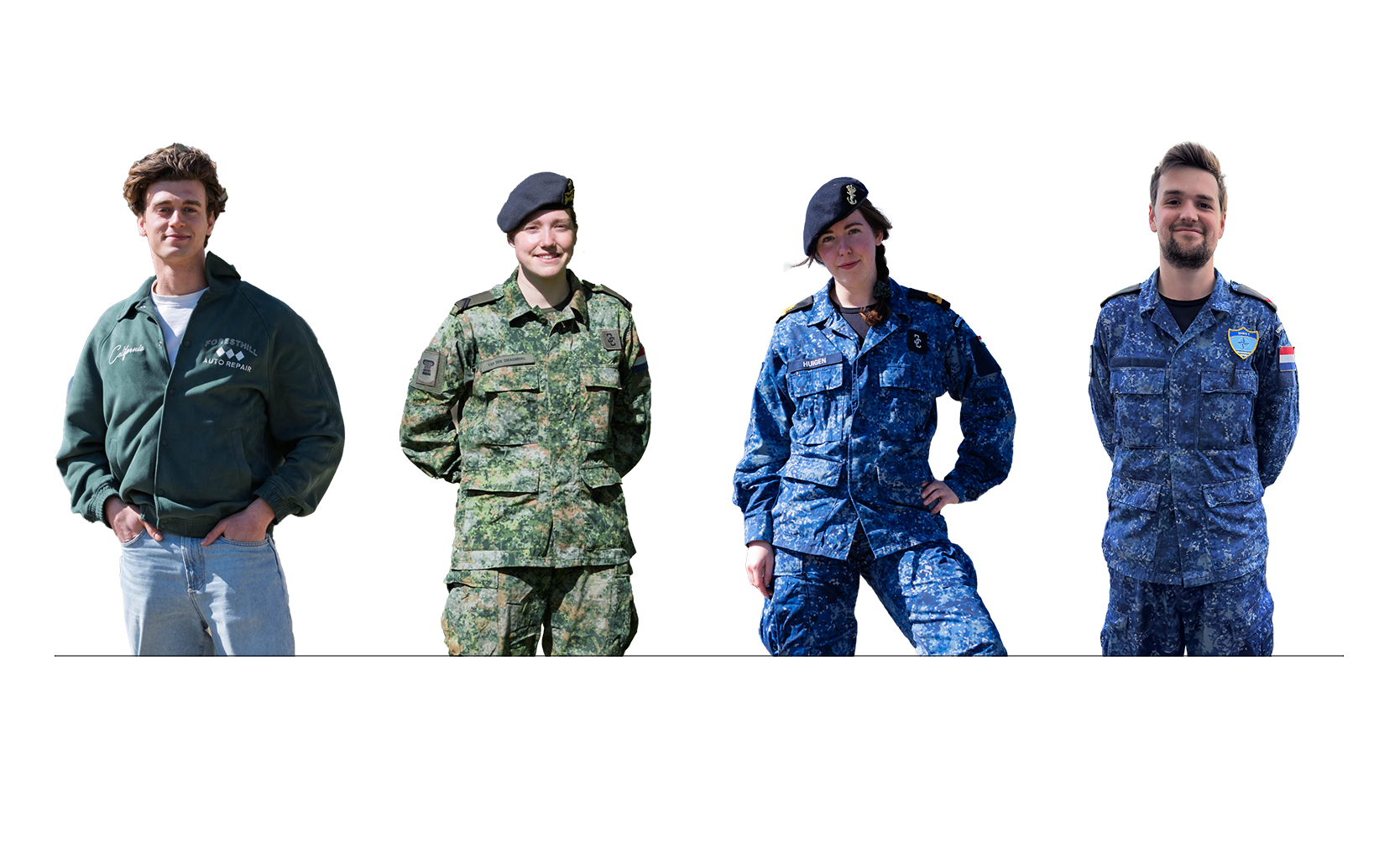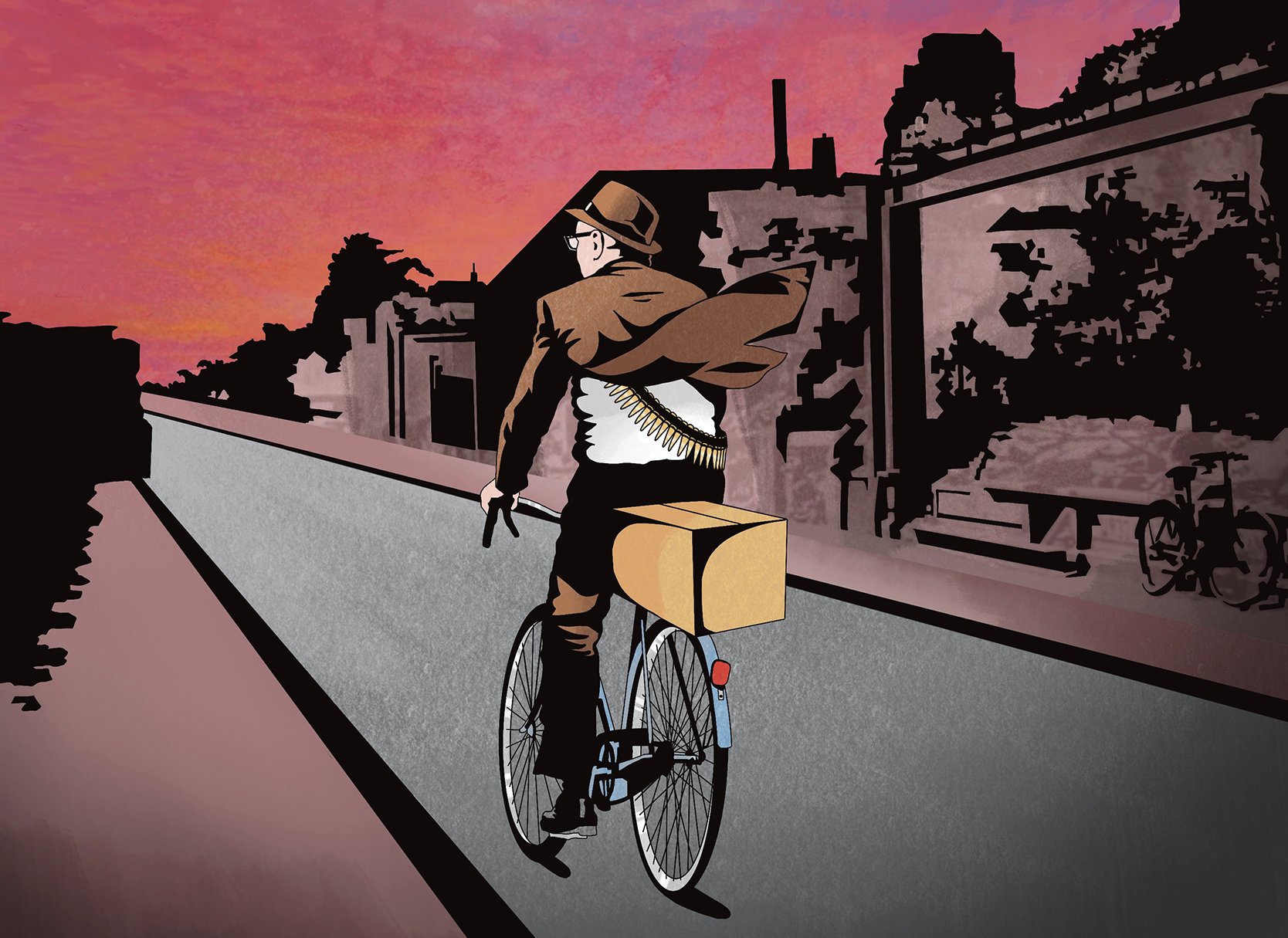War in Ukraine, tensions within NATO and an unstable world order. After years of cuts, the Dutch Ministry of Defence is expanding its workforce from 74,000 at present to 100,000 by 2030, with the possibility of scaling up to 200,000 people in an emergency. The armed forces offer various options for students wanting to get to know them. Resource spoke to four WUR students who are involved in the Dutch military.
Thijs Neggers (23) has paused his Master’s in Biology to serve in the navy for a year.
‘A year of service is a nice way of getting to know the armed forces. After basic military training, you spend a year in the military police, the navy, the army or the air force. I chose the navy, and since mid-March I’ve been sailing on the Tromp, an air defence and command frigate. Our ship currently leads a NATO fleet. That feels quite special. We patrol the North Sea and are now near Iceland.
‘During the basic training, you have to do all sorts of tests. Obstacles through the water, target practice, or crawling across the grass at four in the morning. It can be gruelling, but it’s also a really cool experience. In week four of the training, 18 of us shared a tent at minus eight degrees. We were in each other’s pockets, everyone was extremely tired… so you really get to know each other well. I find that solidarity something special; you don’t get that at uni.
‘Life at sea mainly consists of training. We do a lot of radar and identification training. Officially I’m in the logistics service, which means that I help with food, for example. But I’m allowed to see what others are doing.
‘I started doing this because I can see that the world is changing. If something happens, I want to be knowledgeable and not helpless. In the military, you learn to be disciplined, deal with hierarchy, develop as a person and push your boundaries. I don’t know yet whether I want to stay with the military. If the answer is “yes” after this year in service, I’ll probably do the officer training programme. But I also like biology. If I choose to do that, I will remain a reservist.’
I find that solidarity something special; you don’t get that at uni
Floor Huigen (25) is doing a Master’s in Sustainable Business and has been working at Defensity College, in the navy, since summer 2023.
‘A housemate of mine worked at Defensity College, a programme for students who want to use the expertise from their studies in the military. You receive military training and become a reservist in the army, air force, navy or military police. Additionally, you work on an assignment at least one day a week. That housemate did such cool things that I also got excited. At the same time, I doubted whether I could handle it. On my housemate’s recommendation, I applied. There’s a strict selection process, so I reckoned I would find out automatically if it was too much for me. With each round I advanced, I found myself getting more and more excited. Yet even after I was hired, I continued to feel a kind of impostor syndrome, as if I didn’t actually belong among those tough people in the military.
‘I’m now a year and a half in, and I’m more grounded and confident. The basic training has given me military skills. I’ve taken part in exercises in Scotland and a mountain training programme in Germany, learning military skiing and practising avalanche rescue operations. You learn to collaborate in all sorts of circumstances and how to lead others in a way that suits you. There are so many things you can do within the Defensity College programme. Last week, for example, I went to Ypres for a tour of the site of a battle from the First World War. Super interesting, and you get paid well for it. It’s also a fun group of students. We celebrate our own Foundation Day each year with a symposium and gala, and we hold sports days and get-togethers with military work students from the same city.
‘After two promotions, I’m now a sublieutenant. At the moment, I’m helping organize the forces-wide swearing-in for reservists, an event in The Hague where reservists swear allegiance to the King.
‘My work in the military takes up about 20 hours a week. During the holidays I’m sometimes on exercises, and then it’s 24/7. To be able to combine it with my studies, I have to plan well. I often work on the train, in the evenings and in the weekends. It requires flexibility, from my fellow students and my teachers too at times. Sometimes it works, sometimes it doesn’t.’
The basic training has given me military skills and I’ve taken part in exercises in Scotland and Germany, practising avalanche rescue operations
Martijn Smakman (24) is doing a Master’s in Spatial Planning. He has just been accepted by Defensity College.
‘After a long application process, I was accepted by Defensity College on 1 April. I still have to do my basic military training. After the introduction, I’ll look for a position within the military. I come from Breezand, just south of Den Helder, and we always used to go to the navy’s open days. Despite that, I applied to the army because I think it’s a better fit with my degree subject, spatial planning. The expansion of the armed forces also means the training areas will need to expand, for instance. How do you do that while taking account of nature, local residents and other stakeholders? I think it would be really interesting to help with issues like that.
‘After the Cold War, the military no longer seemed necessary and it was scaled back a lot to save money. However, recent developments have shown that a strong military really is important. I thought: in these turbulent times you can stand on the sidelines feeling scared, or you can do your bit, push yourself, learn things and know what to do if all hell breaks loose.
‘I’m hoping the military will be a challenge – physically, mentally and intellectually. I hope to be joining training exercises in the Netherlands and abroad, doing the Four Days March with a backpack, as well as working on an assignment where I can put the things I’ve learned in my degree to good use.
‘You have to spend at least one day a week on an assignment, so that could make combining it with my studies difficult. Teachers vary in their attitudes to this. Some think it’s great, whereas others immediately start protesting and saying that’s going to be a problem for the schedule. But the bottom line is that the country needs more reservists. So I would ask teachers to be a bit flexible.’
I thought: in these turbulent times you can stand on the sidelines feeling scared, or you can do your bit
Verena van den Dikkenberg (25) is doing a Master’s in Landscape Architecture. She is involved in the air force through Defensity College.
‘A former flatmate was at Defensity College. I thought the military was only for strong, tough types and I didn’t see myself in that category. I also had my doubts about the military because the aim may be peace but they achieve it by waging war. Even so, it sounded like an awesome side job. So I went ahead and applied, but I was up front about my doubts. I was taken on anyway and I’ve been doing it for about a year now.
‘Defensity College has jobs for students on all kinds of degree programmes. For my first assignment, I looked at the effects of the Natura2000 laws on the redevelopment of the naval port. That meant spending one day a week in Den Helder. I’m now on my second assignment. I’m looking at the redesign of that port along with two landscape architects in the Government Real Estate Agency — both former WUR students. It’s a challenge because a lot of different activities have to take place in a limited space. Afterwards, I will look at how to streamline the training of medical staff at Defence Ministry locations. At the moment, the different locations often use different approaches, which is not handy.
‘My Defensity College activities take up at least one day a week, but it can be two or three days. That’s doable if you don’t mind studying or working in the evenings and weekends sometimes to catch up.
‘During military training, you find out new things about yourself, for example how you respond to stress. Next summer, I want to go to Lofer in Austria to do mountain training — take on a physical challenge and learn to collaborate and take charge.
‘As a reservist, you can be called up if a NATO territory is attacked. I’m not exactly desperate to be sent to the front, but on the other hand I don’t want to be sitting at home doing nothing either. I’d rather play my part.’
As a reservist, you can be called up if a NATO territory is attacked

 Thijs, Floor, Verena and Martijn in uniform. Photos Guy Ackermans.
Thijs, Floor, Verena and Martijn in uniform. Photos Guy Ackermans. 

![[The Proposition] ‘Peaceful times make unthankful citizens’](https://www.resource-online.nl/app/uploads/2024/07/WEB_de-stelling.png)